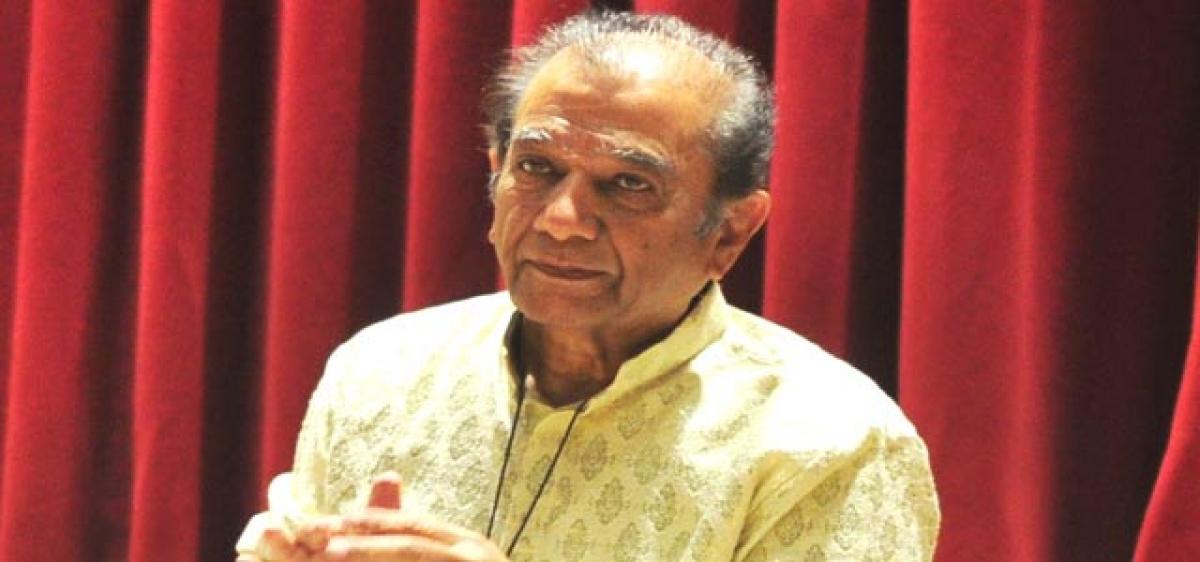Live
- World Development Corporation Introduces LawTech and Advanced Doctorate Program
- Benefits of Joining a Good IAS Institute for Civil Services Preparation
- 7 Best Ways to Save Money on Your Home Loan
- Best and healthiest smoothies for your summer breakfast to enjoy
- Buddha Purnima 2024: Auspicious Timings, Date and Significance
- Embracing Life with CML - A Comprehensive Guide to Proactive Management
- Alcaraz pulls out of Italian Open due to forearm injury
- SC issues notice for contempt proceedings to two NCDRC members
- MP CM Mohan Yadav mocks Rahul Gandhi for picking Raebareli LS seat
- KASHISH 2024 to host ‘Fire’side chat with Deepa Mehta
Just In

Sitar Maestro Ustad Usman Khan has a musical lineage of being the grandson of the legendary Ustad Rehmat Khan, one of the Navaratnas in the court of the Maharaja of Mysore; and son of Ustad Abdul Karim Khan, who was the head of the faculty of music at the Karnataka University.
Sitar Maestro Ustad Usman Khan has a musical lineage of being the grandson of the legendary Ustad Rehmat Khan, one of the Navaratnas in the court of the Maharaja of Mysore; and son of Ustad Abdul Karim Khan, who was the head of the faculty of music at the Karnataka University. He was recently in Hyderabad on the invitation of J Krishnamurti Centre.
Excerpts:
How do you think that music can help any individual?
I have to constantly tune nearly 20 strings on my Sitar. But in life, one has to continuously tune our ‘inner strings’. Music develops this capacity in an individual to seek the right path in life.
How far is the presence of Indian classical arts worldwide?
Indian classical arts have always been appreciated worldwide since time immemorial. It’s a known fact that times are changing very fast but the interest in classical arts can never die. It’s always a slow process and will continue to be the same. Classical arts cannot be understood in a day. With the blessings of Swami Shantanand Saraswathi, who founded the ‘Temple of Fine Arts’ in Malaysia, we have been able to come up to a level of teaching Indian classical arts at the moment, to nearly seven thousand students worldwide. I am the International Dean for the ‘Temple of Fine Arts International’, which has centres in Singapore, Kuala Lumpur, Penang, Johor Bahru, Malacca, Perth, Colombo, Coimbatore, Chennai and New Jersey.
Do you think that traditional music will survive the onslaught of fast-paced music?
Nowadays we see a lot of trend of ‘fusion music’. It is very important for all the artistes’ fraternity to understand the importance of traditional music and spread it among the masses. This is not an easy job when there is a new wave of fusion and electronic music. But there must always be a constant effort to be grounded to the ‘original’ art form. The effort must constantly be made to see that the listener gets at least a chance to appreciate it. Lift them to the higher level of classical arts.
What is the change that you see in the music arena today?
In the past, many great musicians used to sit together and discuss on music and other aspects of life. One could see the ‘Sadhak’ through their eyes, their talk and their behaviour. This is a ‘Sadhana’. ‘Nirpeksha Sadhana’. Many young musicians are doing good work. But there is sometimes a bent towards making quick money or publicity. There is always a hurry to travel abroad, keep doing concerts every given minute and be all over the place. All the great artistes of the past have been very simple and sometimes faced difficult times. They never compromised on their values in spite of having a tough life. Music gives you tremendous scope for innovation and creativity. But that does not mean you create ‘loudness and speed’. Then the beauty and essence of performance are lost.
Any memories of Hyderabad?
I can never forget that my first public concert at the age of 26 years in Pune was with the accompaniment on tabla by Ustad Shaik Dawood of Hyderabad. After that, there were many occasions when Dawood Saheb accompanied me in life. He was a man of few words, but was one of the finest accompanists and guide in my music world.
What is your message to the younger generation?
Discipline and freedom go hand in hand. Follow discipline and it will automatically give you freedom. Freedom without discipline can always lead to ‘chaos’. Enjoy all the good things that come your way in life but do not forget to draw the line. Concentrate on what you are doing. You cannot be on the mobile phone Apps and at the same time play or listen to music.
By Jaywant Naidu

© 2024 Hyderabad Media House Limited/The Hans India. All rights reserved. Powered by hocalwire.com







